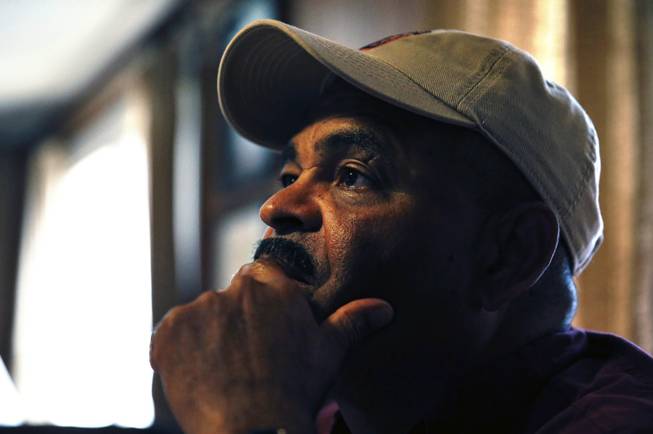
Brennan Linsley / AP
Retired U.S. Army Sgt. 1st Class Marshall Powell sits at the dining room table March 16, 2015, and pauses while talking about his emotionally traumatic experiences serving as a military nurse in northern Iraq in 2007, during one of the bloodiest years of the conflict, at Powell’s home in Crescent, Okla. Powell recalled the chaos after a bomb attack one August day in 2007: the vehicles roaring up for hours to the Army hospital bringing Iraqi civilians covered in blood, the hallways overflowing with wounded and dead.
Monday, Aug. 17, 2015 | 2 a.m.
“It was just another day in Mosul,” the soldier began, his voice shaking. Sgt. 1st Class Marshall Powell took a deep breath. He couldn’t look at the other three servicemen seated around him in the therapy session.
He’d rarely spoken about his secret, the story of the little girl who wound up in his hospital during the war in Iraq, where he served as an Army nurse. Her chest had been blown apart, and her brown eyes implored him for help. Whenever he’d thought of her since, “I killed the girl” echoed in his head.
Powell kept his eyes glued to the pages he’d written and tried to steady his nerves. He cleared his throat.
He recalled the chaos after a bombing that August day in 2007, the vehicles roaring up with Iraqi civilians covered in blood, the hospital hallways overflowing with wounded and dead. The air had smelled of burned flesh. Around midnight, Powell took charge of the area housing those with little chance of survival. There, amid the mangled bodies, he saw her.
She was tiny, maybe 6 years old, lying on a blanket on the floor. Her angelic face reminded him of his niece back home in Oklahoma.
Back in the therapy room, saying it all out loud, Powell’s eyes began to fill just at the memory of her.
“I couldn’t let her lay there and suffer,” he said.
A doctor had filled a syringe with painkillers. Powell pushed dose after dose into the child’s IV.
“She smiled at me,” he told the others in the room, “and I smiled back. Then she took her last gasp of air.”
•••
Before the war, Sgt. Powell’s very core was built on God and faith and saving lives, not doing anything that could end one. He lost his purpose when the girl died, and he found himself in a nondescript room on a naval base in San Diego trying desperately to save his own crumbling existence before it was too late.
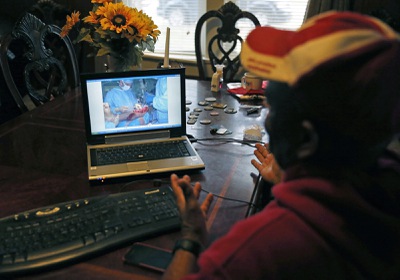
Retired U.S. Army Sgt. 1st Class Marshall Powell sits in his home in Crescent, Okla., on March 18, 2015, looking at snapshots from his emotionally traumatic time serving as a nurse in northern Iraq in 2007, during one of the bloodiest years of the conflict. One night after bombing attack, Powell oversaw a hospital room designated for those with little chance of survival. There, amid the patients, he saw a wounded girl that reminded him of his niece back home. Maybe 6 years old, the Iraqi girl's body was riddled with shrapnel, and her brown eyes implored him for help. Unable to save her, he gave her painkillers and until recently could not forgive himself, or God, for her death.
Surrounding him that day were other veterans who had suffered as he suffered: An Army staff sergeant who’d stood frozen in shock, unable to offer aid to a soldier whose legs were severed in an explosion in Afghanistan. A Marine whose junior comrade was fatally shot after he’d persuaded him to switch posts in Iraq. A Navy man who’d beat an Iraqi citizen in anger after a boy who appeared to be the man’s son opened fire on his squad.
Like Powell, they’d spent years torturing themselves over acts that tortured their conscience. “Souls in anguish” is how some experts describe this psychological scar of war now being identified as “moral injury.”
Unlike post-traumatic stress disorder, which is based on fear from feeling one’s life threatened, moral injury produces extreme guilt and shame from something done or witnessed that goes against one’s values or may even be a crime. The term was introduced in the 1990s by a now-retired Department of Veterans Affairs psychiatrist, Dr. Jonathan Shay, who recognized the problem in Vietnam War veterans he was treating.
While the idea of warriors feeling remorse over battlefield horrors is not new, moral injury has gained attention following the wars in Iraq and Afghanistan as mental health providers point to it as a reason why veterans aren’t improving with PTSD treatments. More than 390,000 veterans of those conflicts have sought help through the VA for PTSD.
The VA website includes a page dedicated to moral injury, and the Navy now runs one of the military’s first residential treatment programs that addresses the problem — the one Powell found.
Still, debate persists over whether moral injury is a part of PTSD or its own condition. There is no formal diagnosis for it by medical professionals, and no one knows how many veterans may suffer from it.
Research into moral injury “is a work in progress,” said Dr. Matthew Friedman, a senior adviser to the VA’s National Center for PTSD.
Some contend the military is reluctant to more formally recognize the concept because doing so could mean sweeping changes in training and culture.
“Disobeying legal orders perceived to be immoral could be permitted in some circumstances. Dehumanizing our nation’s enemies could be discouraged,” said Army Lt. Col. Douglas Pryer, a military intelligence officer who writes about moral injury to raise awareness.
Pryer suffers from the condition; he feels he did not do enough to protect soldiers injured by a blast in Iraq.
Shay and other psychiatrists who have treated moral injury believe it has contributed to the suicide rate among veterans, who account for 1 out of every 5 suicides in the United States. And they see danger in ignoring it because its treatment is distinct.
PTSD sufferers can find relief with prescription drugs and private counseling that encourages reliving the triggering incident to work through fear. But if the person considers what happened to be morally wrong, reliving it may only reaffirm that belief.
Counselors have found the self-punishment stops when veterans learn the deed does not define who they are. Veterans, the experts said, find comfort in sharing with each other, because only those who’ve experienced war can truly understand the complexity of morality on the battlefield.
“A psychiatrist may say they understand, but they don’t really,” said Elvin Carey of Murrieta, Calif., whose fellow Marine died after the two switched places. “We’re comrades with a mutual suffering, a brotherhood. The pain brings everyone together and creates a bond that no one can break.”
•••
Sgt. Powell is a friendly man with a warm smile who finds peace working the land on his family’s farm outside Crescent, Okla. He said he wanted to share his story because he hoped it might prompt other veterans to seek help before it’s too late.
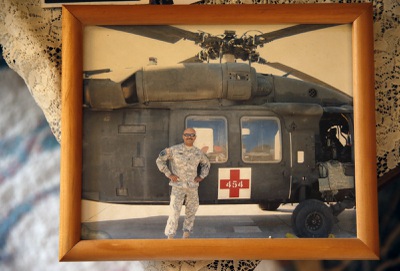
A photograph of now-retired U.S. Army Sgt. 1st Class Marshall Powell standing with a U.S. Army Medevac helicopter in Iraq during his last tour to the country is seen March 17, 2015, at Powell's brother's house in Crescent, Okla. Powell, who served as a military nurse in Iraq and Afghanistan, was deeply haunted by his experiences, and nearly lost his own internal war with depression before finding meaningful help.
And while he had always blamed himself for the girl’s death, three toxicology experts interviewed by the Associated Press said the amount of Demerol and morphine that he administered to the girl — 20 milligrams — is not unheard of in caring for dying children. Her injuries, not the drugs, likely caused her death, they said.
By the time he arrived in San Diego in February 2014, Powell was on therapist No. 5 and contemplating suicide. His wife, also a soldier who served in Iraq, had received treatment for PTSD and couldn’t understand why her husband wasn’t better. Neither had heard of moral injury. Powell, then 56, knew only that the beliefs that had shaped his life were shattered.
He was raised on the idea that God has a reason for everything. It was the mantra his family drew strength from in the face of poverty and racism in rural Crescent. The old slave songs sung at the clapboard Zion Baptist church spoke of it too.
“When a man’s down, if he stays down, he done lay down,” Powell’s older brother, Bob, said once when young Marshall flopped down on the porch, upset over being called a racial slur at school. “You need to get on up from there.”
He learned to pick himself up from even the darkest depths. After Bob died in a car accident, Powell, then in the Air Force, started using drugs, quit the service and wound up sleeping on the streets of Dayton, Ohio. He returned to Crescent and to Sunday services, apologizing to the pastor for having only a dime to drop in the basket. The reverend gave it back, along with $43 in donations, and told him to keep his faith.
“God hears you,” the pastor said.
The next day, Powell joined the Army and later signed up for the nurse corps.
“I didn’t know I had that much compassion until I got into nursing,” he said.
But the girl was something he couldn’t get back up from. Months after her death at the 28th Combat Support Hospital in Mosul, Powell was sent back stateside to Hawaii. Soon, she was appearing in his dreams — back on the hospital floor, her eyes pleading.
Her death left him questioning God, and himself most of all. Powell started drinking heavily and sought help for PTSD, seeing a therapist weekly for months. He was prescribed pills for insomnia, depression and anxiety. But, he says, “I couldn’t beat it.” After six years, a therapist recommended the program at Naval Medical Center San Diego.
Called Overcoming Adversity and Stress Injury Support, or OASIS, the program started in 2010 with the aim to help service members not finding success with PTSD treatments. Three years later, therapies addressing moral injury were added after clinicians determined it was a leading reason why the troops were still struggling.
During the program, veterans get one-on-one counseling and sleep therapy to deal with their PTSD. But to address the soul wounds specifically, therapists use what’s called adaptive disclosure therapy — which involves asking patients to reveal their triggering incident to other veterans also seeking to recover.
Seven other servicemen were part of Powell’s 10-week session. At first, they kept to themselves. Then one afternoon, as part of an exercise to build trust, they had to pass a ruler while balancing a marble on top. Soon they were cracking up.
After that, the therapists stepped back and let the service members mostly lead the conversations. After the second week, the veterans were asked to put in writing what had triggered their moral injuries. It took Powell two weeks just to get it all down.
The men had known each other for a month when they were divided into two groups to share their stories. They vowed not to lie.
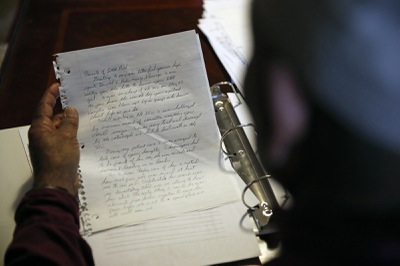
Retired U.S. Army Sgt. 1st Class Marshall Powell sits at his home in Crescent, Okla., on March 16, 2015, reading a letter he wrote to the parents of an Iraqi girl who died right in front of him after an attack. Powell is recovering from a condition diagnosed as "moral injury" and wrote the letter as part of his therapy.
When Powell was finished, the men in the room were silent at first. Among them was Carey, who, listening to Powell, felt a real connection to someone for the first time in years. Steven Velez was there, too, flashing back to his time as an Army staff sergeant in Afghanistan, when he was too traumatized to help his comrade. He stood and shook Powell’s hand.
“You did your best,” he said. “You didn’t do anything wrong.”
The others told Powell the same. Unleashing the secret was a turning point.
In the program’s final weeks, Powell and the other men were told to write a letter of apology or reconciliation as a way to finally find self-forgiveness. Powell addressed his to the little girl’s parents. He’d never met the couple or knew if they survived the bombing, so the letter went nowhere. But it helped to put down the words and read them aloud to his fellow veterans.
“I want you to know,” he wrote, “your daughter has been in my heart each day since that night.”
•••
A year ago April, Powell left OASIS with new tools and hope and friends he could always lean on. He was honorably discharged from the Army last August, an “Army proud” vet with a Bronze Star for serving as the only medical provider at an outpost in Afghanistan. He’d been deployed there in 2012.
After his treatment ended, he tried nursing again, taking a job at a home for the elderly in Crescent. He quit two months later after a woman he’d grown close to died. He realized he no longer had it in him to do the job he once loved. Now, he’s pursuing a degree in industrial engineering.
He also finds ways to give back to his community, which helps him feel better about himself. To give dignity to the dead, he’s been cleaning up a weed-covered cemetery where former slaves, including his great-great-grandmother, are buried.
Powell’s wife, Arasi, says he has stopped drinking and seems different.
“I notice a change,” she said recently as she watched her husband cut brush on the family’s farmland. “I think if he don’t work, his mind is ... I don’t know.”
Whenever he can he heads to those fields, in his family since his great-great-grandmother arrived in Oklahoma to start a new life after being freed. Sometimes, he talks to God as he clears the brush around the walnut trees.
“I feel peace, redemption when I talk to him out there,” he says. “I know he forgives me.”
Powell has finally forgiven himself, too, but he knows he’s not entirely healed. When his self-doubt returns, he runs down a list of “challenging questions” he brought home with him from OASIS: Is your belief a habit, or based on facts? Are you taking the situation out of context and only focusing on one aspect of the event? Are your judgments based on feelings rather than facts?
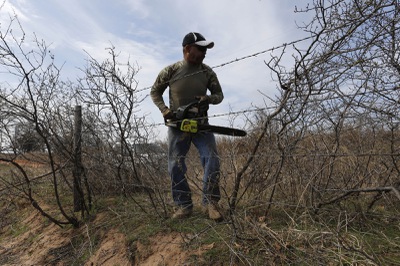
Retired U.S. Army Sgt. 1st Class Marshall Powell clears brush from his land outside Crescent, Okla., on March 17, 2015. Powell is recovering from a psychological wound called "moral injury" after serving as an Army nurse in Iraq and Afghanistan. Whenever he can, he heads to his fields. Sometimes he talks to God as he clears the land. "I feel peace, redemption when I talk to him out there," he says. "I know he forgives me."
He still takes medication for anxiety, depression and insomnia. But more than anything, he leans on the seven men who went through treatment with him. “My brothers,” he calls them. Their cellphones have become a lifeline, with daily texts and pleas for help that come at all hours.
“At least I’m not alone,” Powell texted one sleepless night.
Often Powell, the father figure of the group as the oldest member, is the one giving the advice. Helping them helps him, because he sees that he can still heal others.
The AP shared with Powell the medical experts’ opinions that the girl’s injuries, not the painkillers, likely caused her death. Said one, Bruce Goldberger, professor of toxicology at the University of Florida College of Medicine: “What he did probably was relieve the pain like they do in hospice care.” His comments were echoed by Dr. Erica Liebelt, professor of pediatrics and emergency medicine at the University of Alabama at Birmingham, and Dr. Richard Clark, director of the division of medical toxicology at the University of California, San Diego.
Hearing that brought relief for Powell. “It’s something I’ve been carrying on my back for so many years, that guilty feeling,” he says.
The girl still comes to him at times in his dreams. Not long ago, he envisioned her running through a pasture. Powell yelled at her not to leave.
But he can put a distance between who he is now, and what happened then. And when his heart races and the anxiety returns, he stops to remind himself that he’s not a bad person; it was just a bad situation.
“It will never go away,” he says. “Now, I know how to deal with it.”

Join the Discussion:
Check this out for a full explanation of our conversion to the LiveFyre commenting system and instructions on how to sign up for an account.
Full comments policy